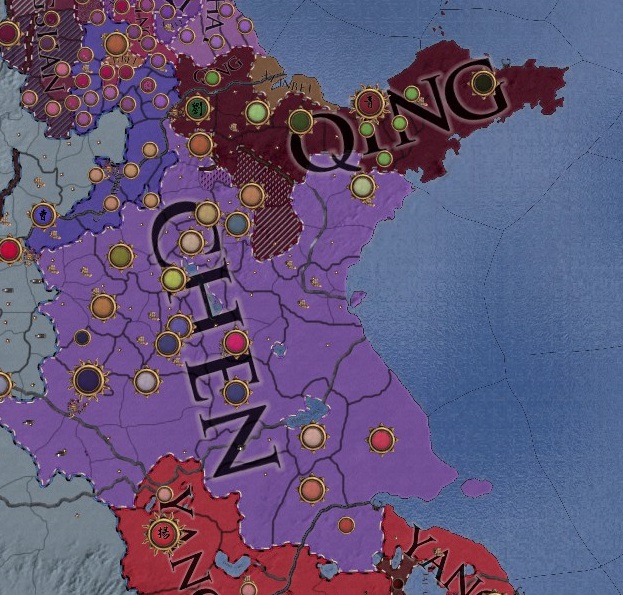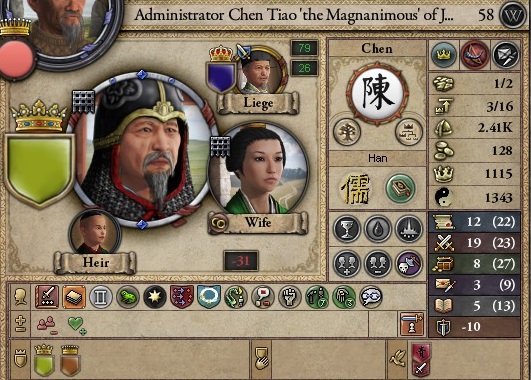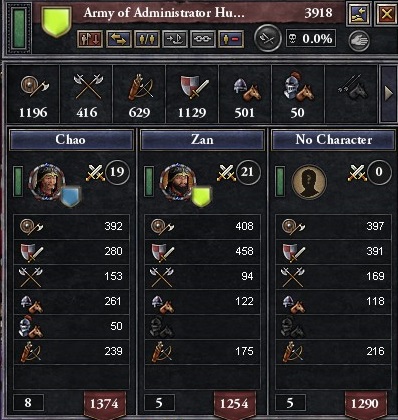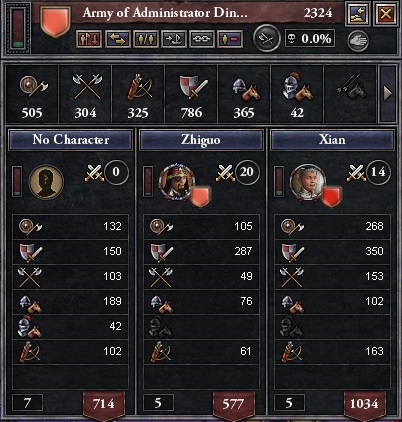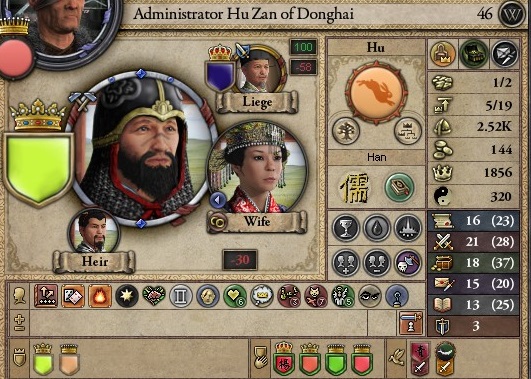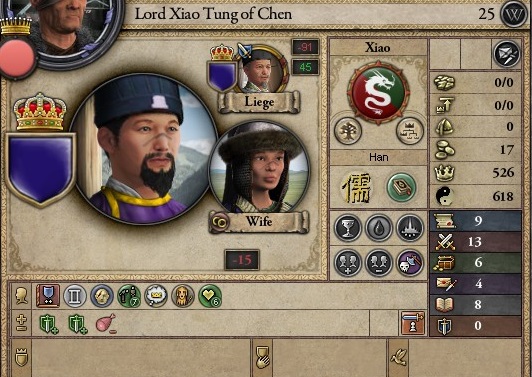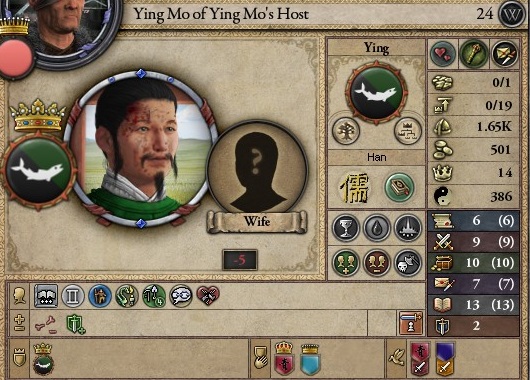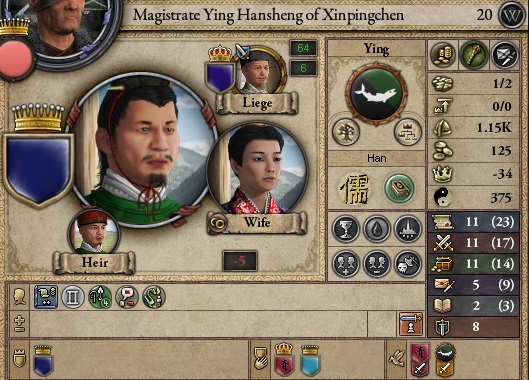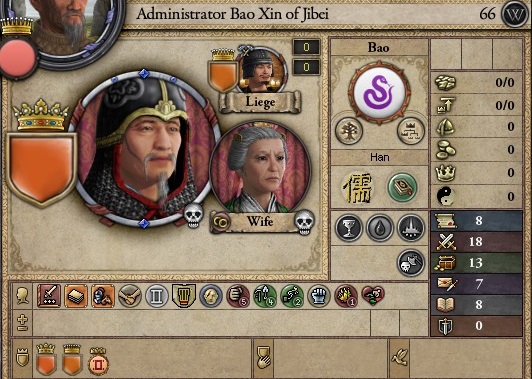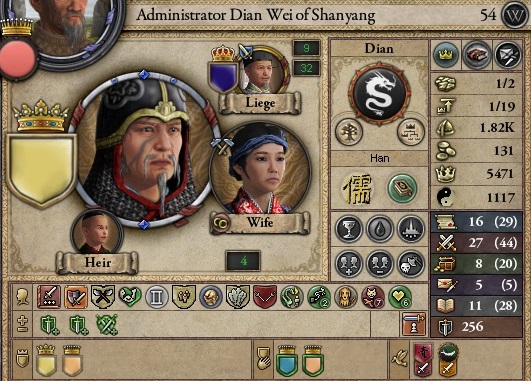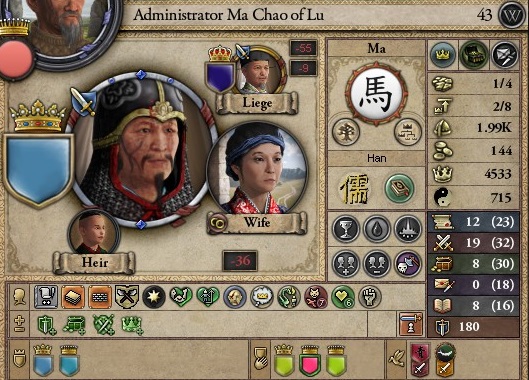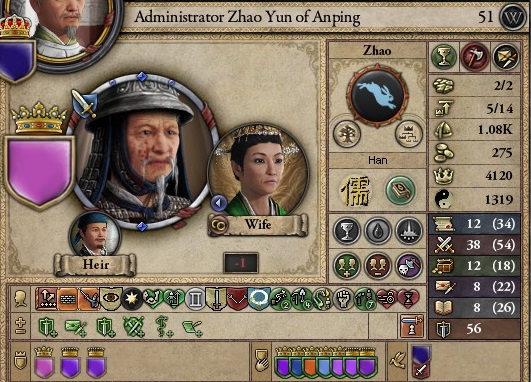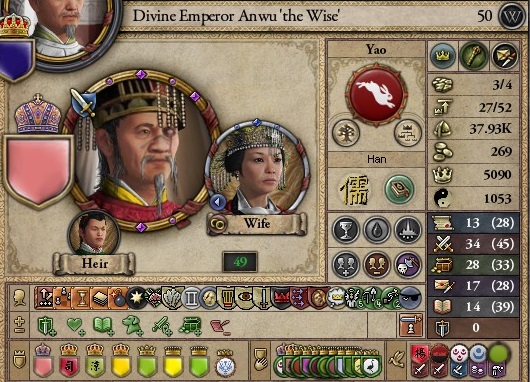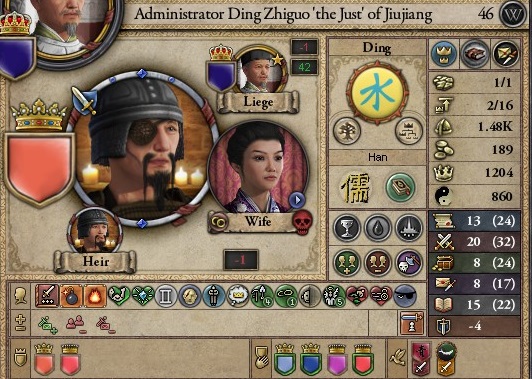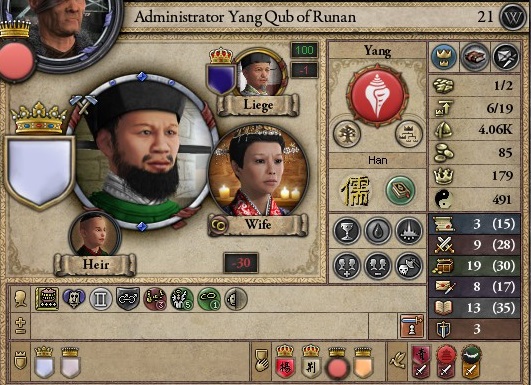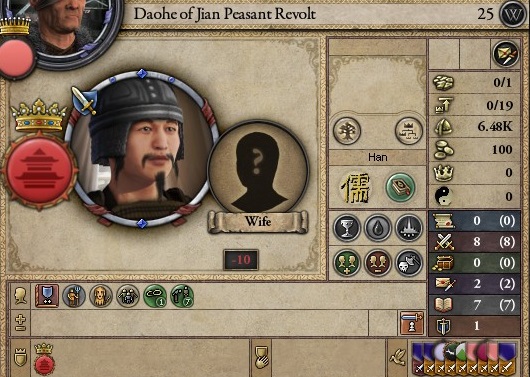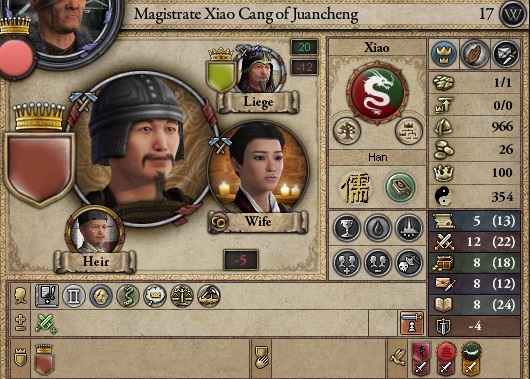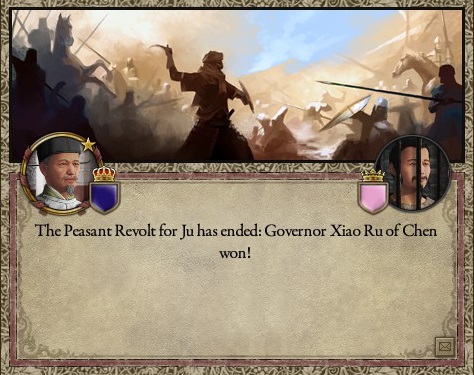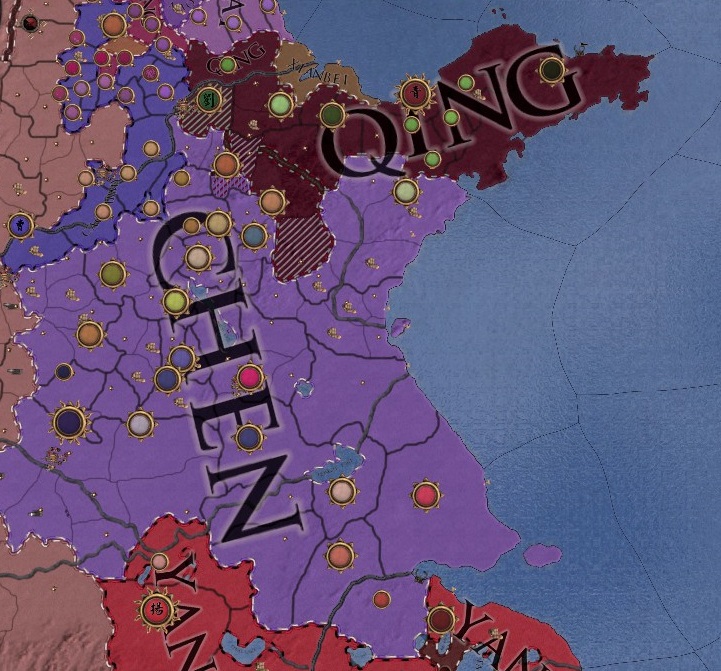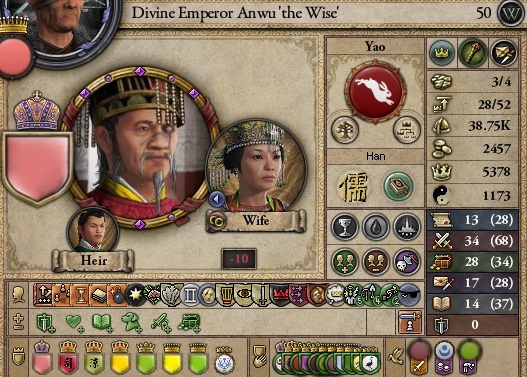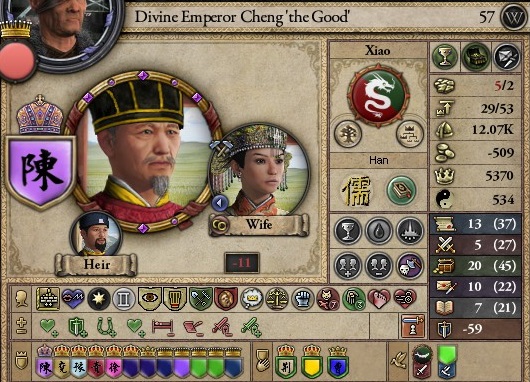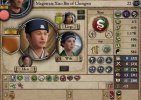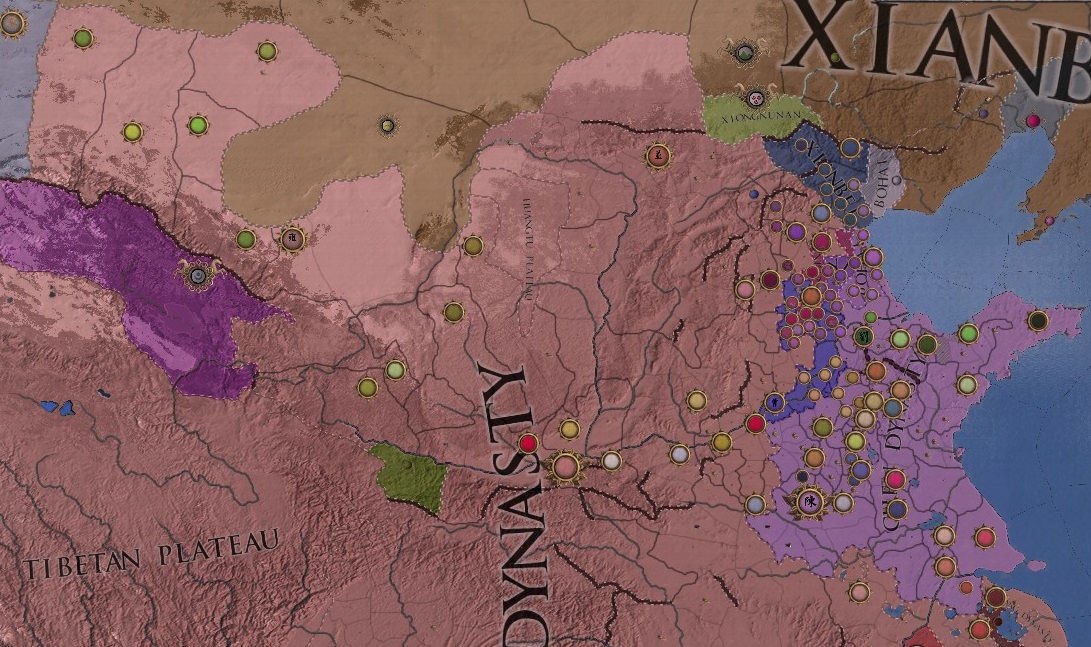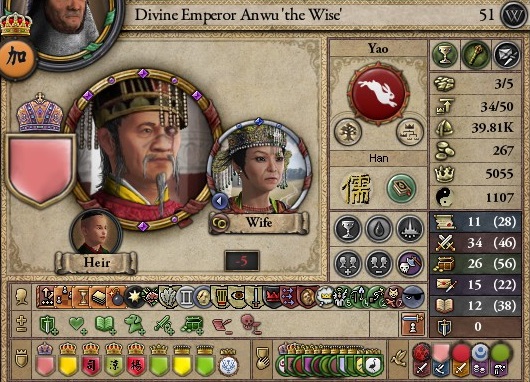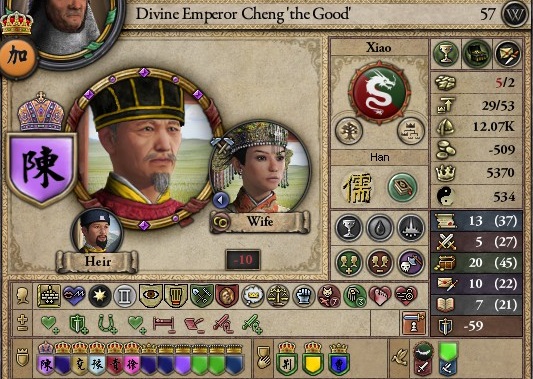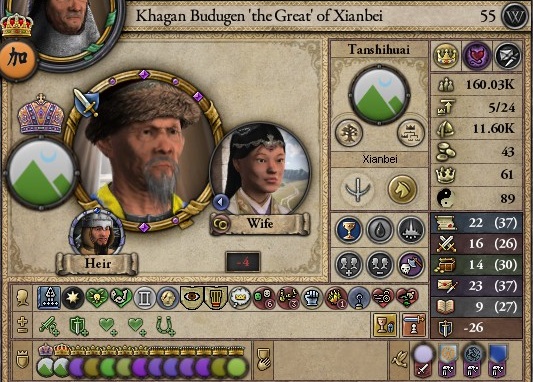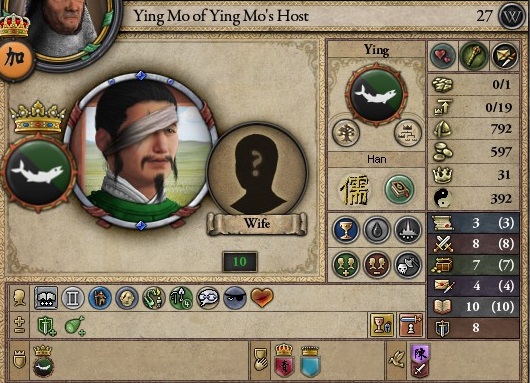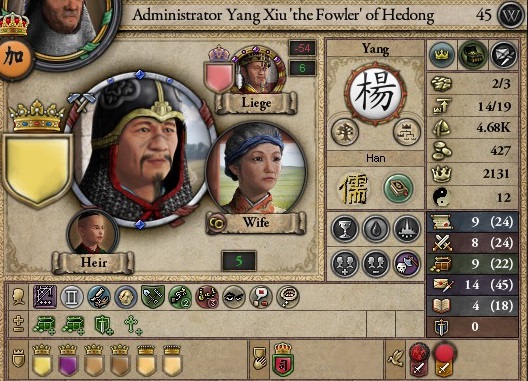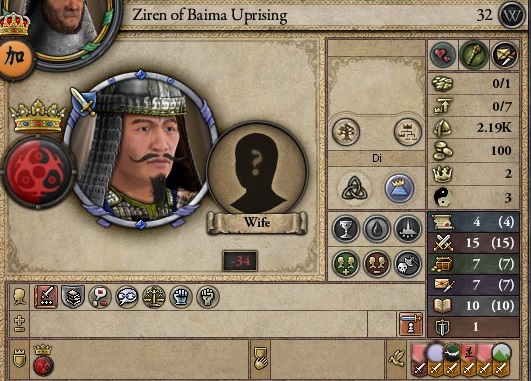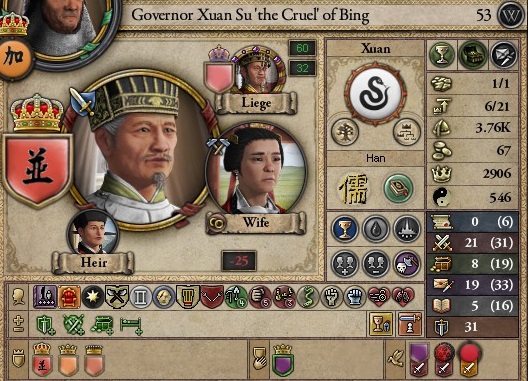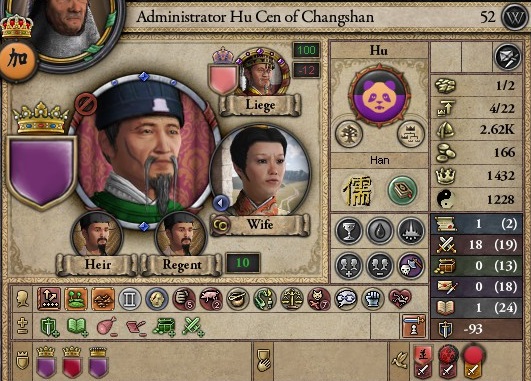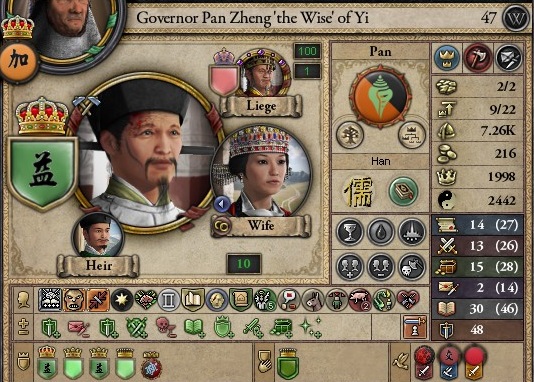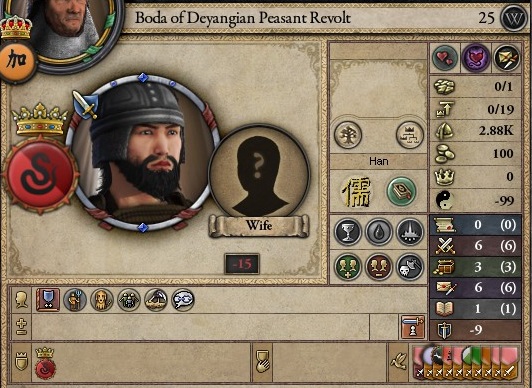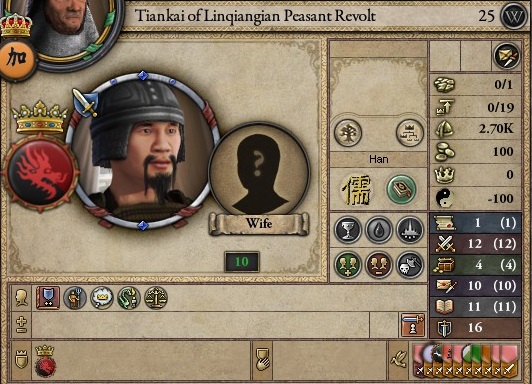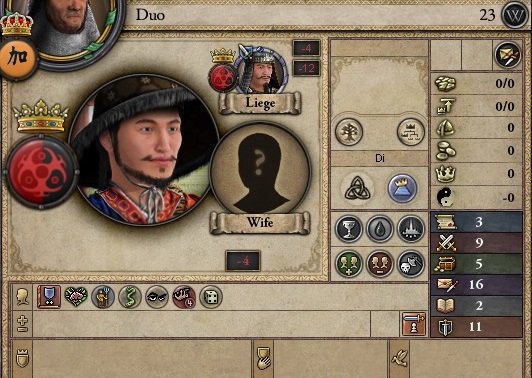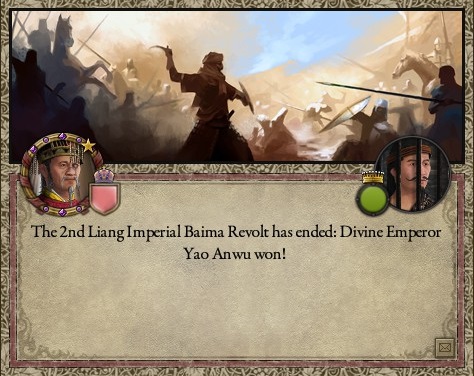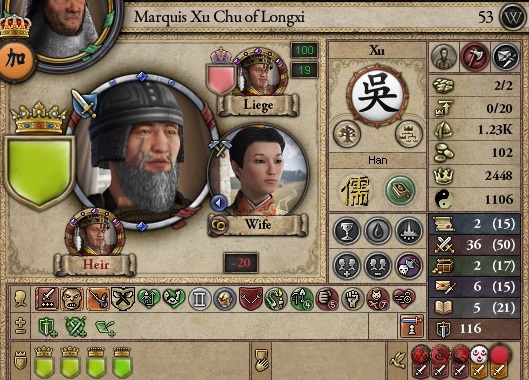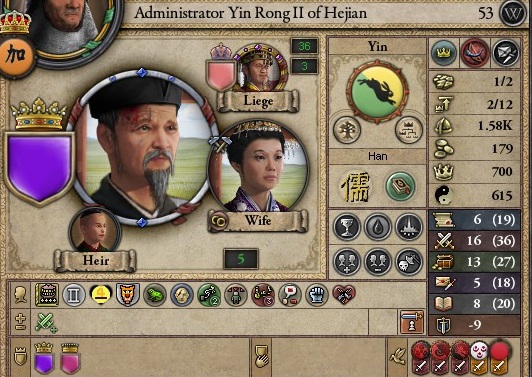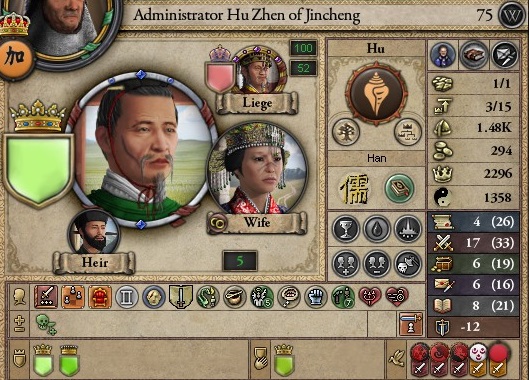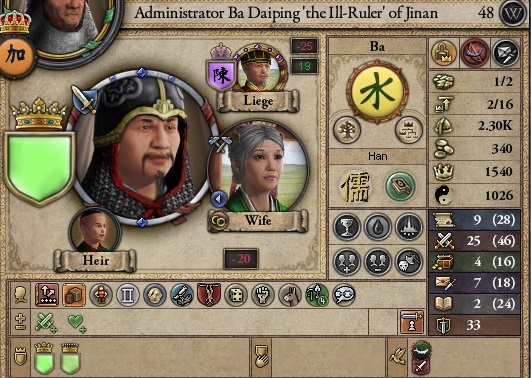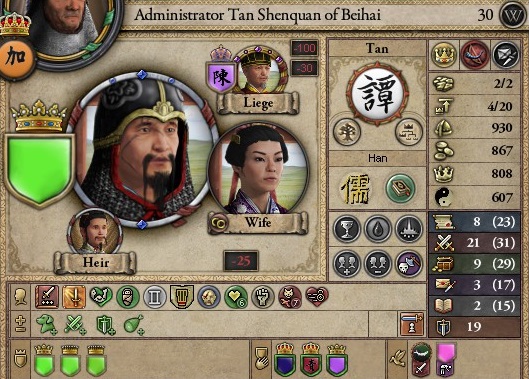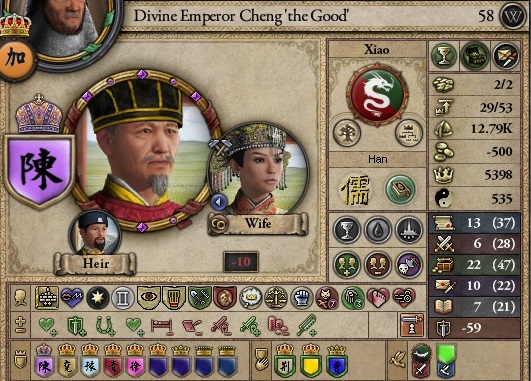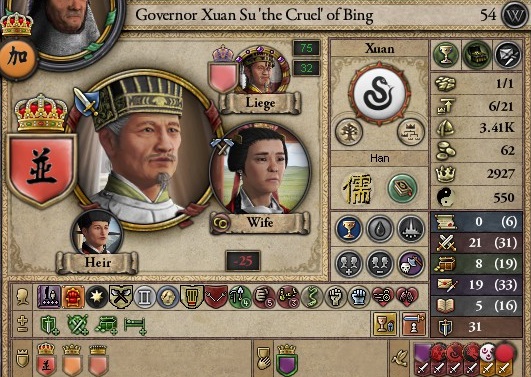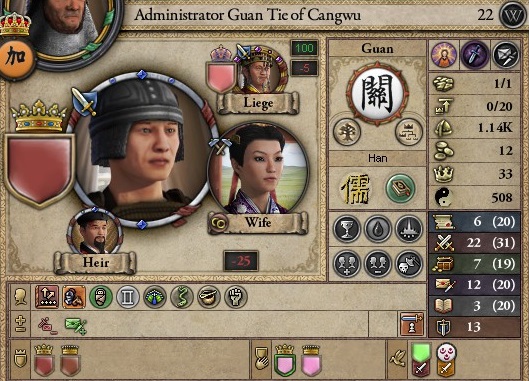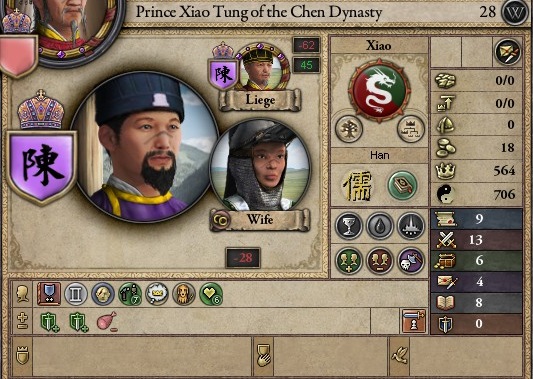219-220: THE FUTURE OF CHEN
In March 219,
Yao Shuren had Emperor You abdicate the throne to him, thus ending the Han and passing the Mandate of Heaven to a new imperial dynasty, the Liang Dynasty. Yao Shuren, now Emperor Anwu, immediately declared his own reign era and sent missives to the various warlords demanding their submission. This move had been expected, with some like
Yang Weili easily predicting that this was the path that the Chancellor would follow if given the opportunity. Even so, witnessing the end of the Great Han was a shocking moment for everyone, heralding a dangerous and uncertain future for anyone who did not submit to the new Emperor of China.
Xiao Ru could only grit his teeth when the imperial missive landed on his doorstep. He was certainly not going to recognize the usurpation of Yao Shuren and bow to this new Liang Dynasty. Like every remaining warlord, he refused to accept the overlordship of Emperor Anwu and continued to use the Han reign era instead of the new Liang Calendar, a clear signal that Chen Province refused to recognize the regime change.
However, Xiao Ru was in a bind about how to act next on the issue. Yang Weili had actually advised him to install Liu Kun, son of
Liu Siyuan, as the new emperor of a restored Han Dynasty in the east. But this idea didn’t really appeal to him. In fact, Xiao Ru was flirting with the idea of making himself an emperor, now that this taboo had been broken by Yao Shuren. However, after some discussions with his advisors, he realized that this would be the wrong move for the moment. Not only did he lacked the mechanisms that Yao Shuren had to legitimize his usurpation, but declaring himself an emperor now would also put a target on his back. And with the former Han emperor still alive and well, any Han restorationist who fought by his side would desert him the second he declared his own dynasty.
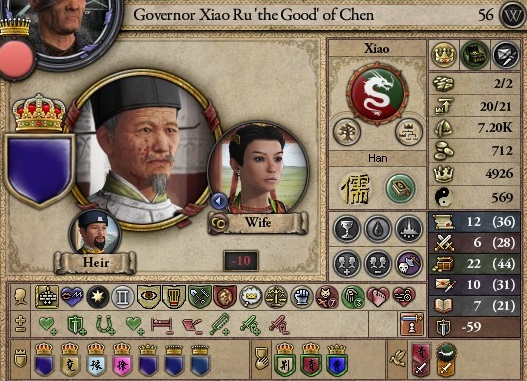
Fortunately, Yao Shuren decided to take care of this in May by having Emperor You assassinated, leaving the Han loyalist cause more divided and uncertain (and thus easier to use for warlords like Xiao Ru). Especially, Xiao Ru quickly started to distance himself from the late puppet emperor, instead insisting on his great loyalty for Emperor Qianfei, the last competent emperor of the Han Dynasty. Of course, this was all for propaganda, and anyone who had been with Xiao Ru during Emperor Qianfei’s reign knew that the Governor did not lift a finger to help the Son of Heaven when he needed it. But it worked well with the masses, as Emperor Qianfei was gaining a reputation as a heroic monarch outside of the Liang Dynasty. In an unprecedented move among the warlords, Xiao Ru even decided in June 219 to roll back the imperial calendar to Emperor Qianfei’s first reign era. This meant not only a denial of Emperor Anwu’s legitimacy, but also of his whole rule as Chancellor of the Han. Thankfully for Xiao Ru, he had timed it just as the Liang Dynasty was moving against Yang Province, leaving him free of reprisals.
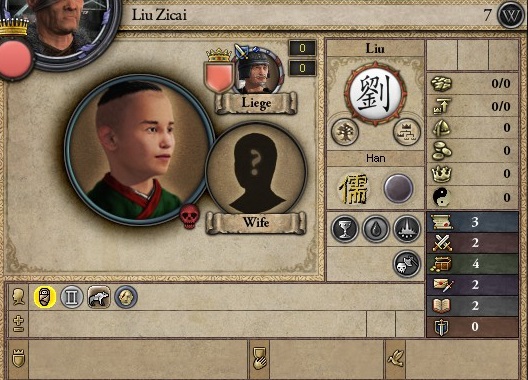
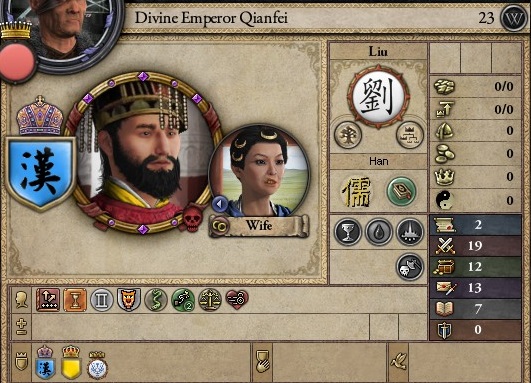
Heading this new propaganda campaign were
Hu Zan (at the time still Chief Censor) and Xiao Bin (Xiao Ru’s third and arguably favorite son). The two men were both ambitious, proud and excellent at performing the duties given to them. But while Hu Zan had become good friend with the oldest son Xiao Tung, he found himself clashing with the personality of Xiao Bin. Their pride and ambitions were obviously a problem, but this was not the main issue. While Hu Zan was cynical and sarcastic, Xiao Bin was stern and manipulative, with Hu Zan once calling him a snake in private. And while Hu Zan was on the greedy side when it came to spendings, the son was proving as willing to spend as the father, leading to some clashes on how much had to be spent on their duties. Xiao Tung’s effort to make them get along stopped these tensions from turning into a full-on rivalry, but no one could say that they came out of the experience as friends.
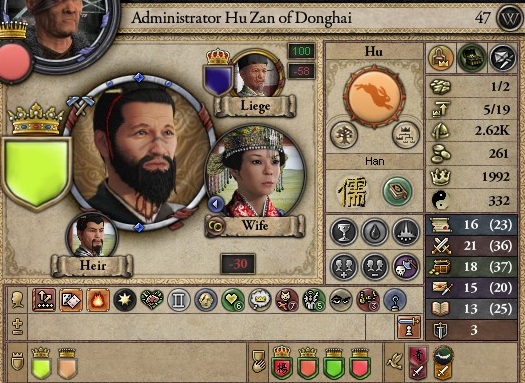
The disputes between the two men on how to best spread the propaganda was solved by the removal of Hu Zan as Chief Censor in July. The relationship between Xiao Ru and his general had been deteriorating over the years, and now the Governor sought any excuse to remove Hu Zan from office. He certainly sided with his son Xiao Bin in his disputes with Hu Zan, and he wasn’t convinced that the general had the “proper attitude” to fulfill his courtly duties, whatever that meant.
But the turning point came from his wife Lady Fahui. After a discussion with Xiao Bin, she decided that she would do a decent job if put in charge of the propaganda. She was sociable and well learned. Surely, she could do these duties with ease. Xiao Ru was unsure, considering that his first wife Lady Xia had used this position to steal from him. But Fahui was no Lady Xia, and Xiao Ru utterly trusted his wife. Hu Zan was fired and replaced on the excuse that he would be of better used on the frontline. While Hu Zan agreed with the assessment, he still held Xiao Ru in contempt for firing him from his office.
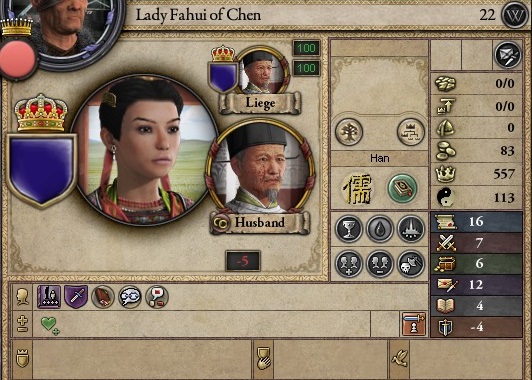
While the generals made their way into Qing Province during the second half of the year, Xiao Ru was starting to bolster his court with new advisors. This notably included the 51 years old Administrator of Pei Commandery, Yan Yi. He was one of the older followers of Xiao Ru, eventually being appointed as administrator in 204 and sticking to his post since then. The man was known for his unlikability, with the only reason for his appointment at court being his years of loyalty and the interest in gardening he shared with his liege. Yan Yi was angry, stubborn, paranoid and crude. And within the span of half a year, he would have alienated almost four of the five Xiao sons due to his toxic personality, with Xiao Hanhe being the only absent of this list due to his continuous attempts to avoid the provincial capital (and his father).
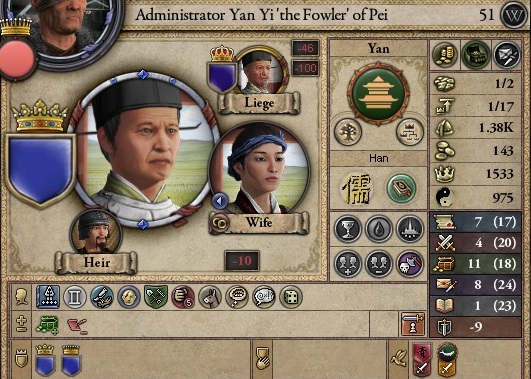
First was Xiao Cang, who he criticized for his role in the military training of the troops. What was he doing, cowardly waiting safely while the others went on the frontline? Even when Commandant Chen Tiao came forward to defend Xiao Cang and the importance of their rear duties, Yan Yi still insulted both of them and called them craven failures. Trying to avoid direct confrontation, the younger son went to Chenguo to complain about the incident to his father. But Xiao Ru actually agreed with Yan Yi about Xiao Cang’s cowardice, especially compared to Xiao Tung’s bravery. This left Xiao Cang confused and shaken, especially since his father was always so opposed to his brother’s military career. The incident would leave Xiao Cang with a permanent enmity of both his father and Yan Yi, as well as put an ever-growing strain on his mental state.
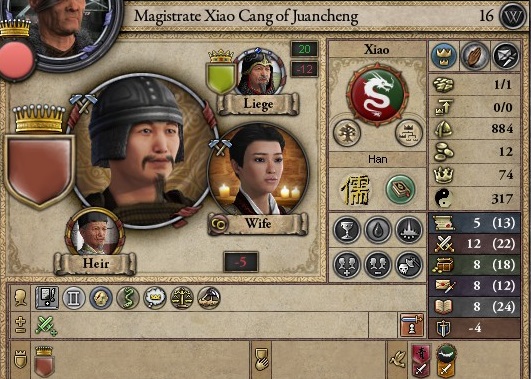
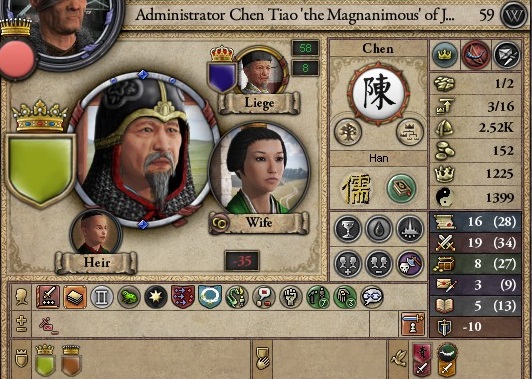
Then came a dispute with Xiao Dang, the fourth son and the Magistrate of Luguo. While a competent administrator, the young man had gained something of a reputation for being a playboy, enjoying the company of women when he was not performing his duties. It was not that he didn’t appreciate his wife either, though he was not enthralled with her as his older brothers were with theirs. Using the fact that she was Zhao Yun’s daughter to spend more time with other women, he drew the ire of Yan Yi, who was baffled by the man’s lack of seriousness. He accused Xiao Dang of ignoring his marital duties, which rubbed the young lord the wrong way. The following day, he had Yan Yi dragged in his home by his friends. There, he pointed to his sons Xiao Ji and Xiao Ne and his daughter Xiao Xinyue before saying
“My duties have been firmly fulfilled!” But Yan Yi didn’t want to listen, so Xiao Dang stubbornly had him dragged daily to give him the same exact lesson until Xiao Ru put a stop to this amusing routine.
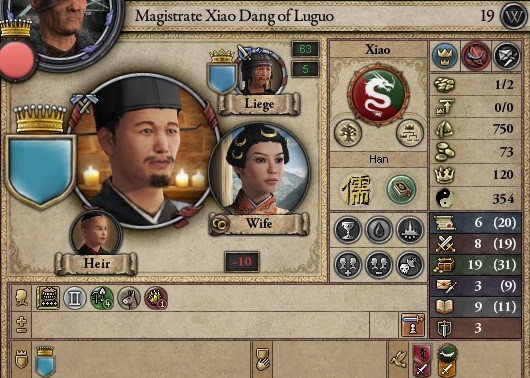
If this wasn’t enough, Yan Yi then managed to get onXiao Tung’s wrong side. He had met the heir previously and did not like him one bit, even though Xiao Tung was known for his kindness and sympathetic personality. So how did he manage to get on the heir’s wrong side? By crossing the one line that Xiao Tung never tolerated: Yan Yi criticized his wife. When he met Changle, he frowned and expressed his disbelief that a disgusting savage had actually been allowed to marry the heir, having always been convinced that this had been slander. Changle did not take these insults lying down, and after two days confronted Yan Yi and made it clear to him that this disgusting barbarian was here to stay, and that he should keep his idiotic opinions to himself. Yan Yi was so infuriated that he raised his fist and prepared to hit her, only for an enraged Xiao Tung to grab his hand and kick the older man in the kneecap. Xiao Tung then made it clear that any further action would not be forgiven. Both men brought this affair to the Governor, leading to a tired Xiao Ru ordering them to avoid each other from now on, hoping that this would solve the issue.
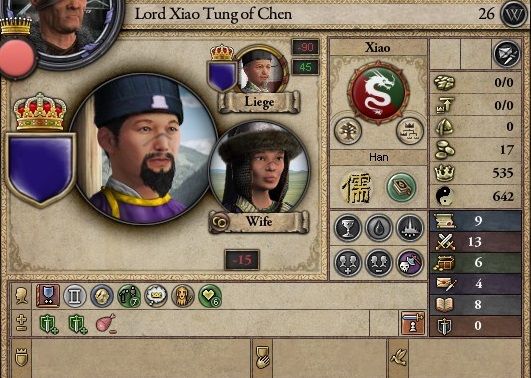
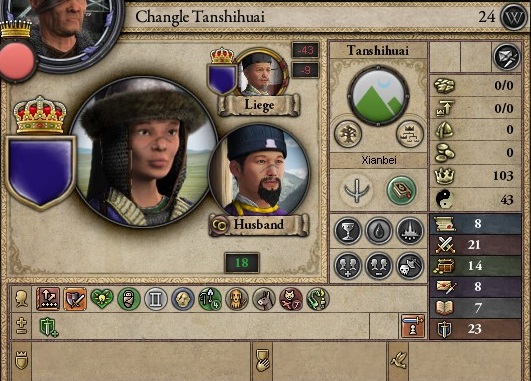
Then a peasant revolt erupted in December, leaving the court confused about the cause of this sudden uprising. Yan Yi certainly had his theory about what had led to this revolt. But he did not identify the source of the problem as Yang Qub’s tax policies, which was the real cause, or the destruction of the war, which Xiao Ru believed. Instead, he blamed it on the stupid handling of the Chen propaganda by Xiao Bin. Clearly such a young and inexperienced boy could not do this job properly. Xiao Bin did not take this insult lying down, and pointed out that Pei Commandery was right next to Xu Province. Maybe Yan Yi’s failure to manage his commandery well had set a bad example for the other officials, leading to the revolt? Yan Yi was insulted and shouted every insult at Xiao Bin in front of the whole court, leading Xiao Tung to come forward to support his brother. Xiao Ru had enough of this. He could see how the man’s presence was causing his sons to become restless. The Governor decided to quietly tell Yan Yi to go back to his commandery to avoid further problems.
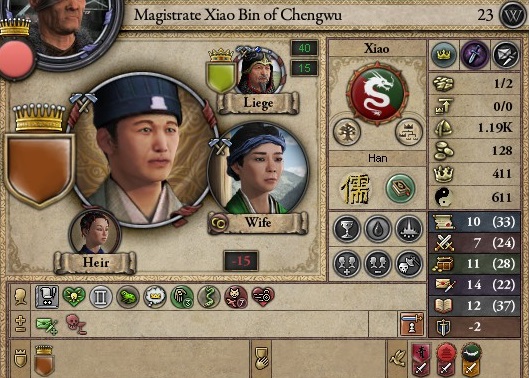
Xiao Ru certainly didn’t want any fuss within his court at the time. By late 219, he had been trying to build the image of a united court loyal to the legacy of the Han. This was most exemplified by a series of appointments in early 220. During these first few months, he appointed four members of the Imperial Liu Clan to important (yet mostly powerless) offices within Chenguo. These men were Liu Xian, the old official from Xu Province who had previously served on campaign against Qing, the Prince of Rencheng (Liu Derun), who had grown up to be a competent young man, the Prince of Lanye (Liu Xie), whose domain was the most hit by the current peasant revolt, and the Prince of Pei (Liu Qi), who had submitted to Xiao Ru decades ago.
Most of them didn’t particularly appreciate the Governor of Chen Province, but his current commitment to help the Imperial Clan and uphold Han values was welcomed by them all. It certainly helped the Chen propaganda to have them around, as Xiao Ru could now claim that he was the only one upholding the Han against the evils of the tyrant in Chang’an. Notably however, he did not enthrone one of them as the new Han emperor, nor any Liu clansman for that matter. Because by now, Xiao Ru was set on establishing his own Imperial Dynasty, with the Liu Clansmen here to offer him some legitimacy once he managed to gain their support and loyalty.
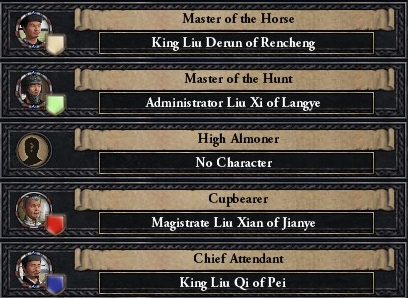
But unlike Emperor Anwu, he didn’t have an emperor to promote him through the usual process of usurpation established by Wang Man. He couldn’t get the Nine Bestowments, nor could he have the Son of Heaven abdicate him the throne. He could get himself a puppet Han emperor, but this might just turn his followers against if he embraced Han restoration too strongly only to turn his back on it later on. But while Wang Man’s legal process of usurpation was not available, he could use the other side of the great usurper’s plan: weird mystical signs and contrived events.
His first move in that direction would be somewhat laughable and far-fetched, yet still more grounded in reality than his following plans. After asking his main scholar Lang to make a full genealogy of his family, the scholar came back with some amazing and absolutely real discoveries. Xiao Ru was directly descended from none other than Xiao He, one of the Three Heroes of the early Han Dynasty and the first Imperial Chancellor of the Han, serving under both Emperor Gaozu (202-195 BC) and Emperor Hui (195-188 BC)! His late father was thus a noble of the highest of lineages, and NOT a simple gardener, which he NEVER WAS, EVER. Possibly just as surprising, his late mother was also of noble birth and a direct descendant of the Dukes of Chen, who ruled their state during the Spring and Autumn Period.
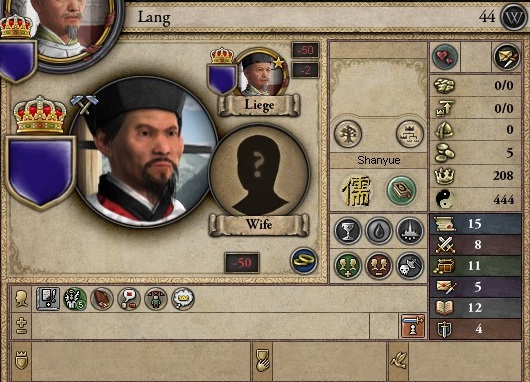
Xiao Bin, fully aware of what his father was doing, suggested that the Imperial Court must have always been aware of his father’s claim to Chen, which was historically right and just. Clearly, when Chancellor
Jiang Xian had sent Emperor Xian’s edict promoting his father as Governor of Chen, it must have actually been a restoration of his noble titles over the region. Xiao Ru declared that this was too important not to be verified, and so ordered the conserved edict to be brought back in front of the court to be read out loud. And indeed, it seemed that he had actually been granted the title of King of Chen! Oh well, he must have read it wrong the previous time! The court immediately encouraged him to adopt the title granted to him by the Han Dynasty, as refusing to do so would signify an abandonment of his duties to the Dynasty. While he feigned refusal, he relented that he had no other choice but to promoted himself. Any good and loyal subject of the Han would have done the same, after all.
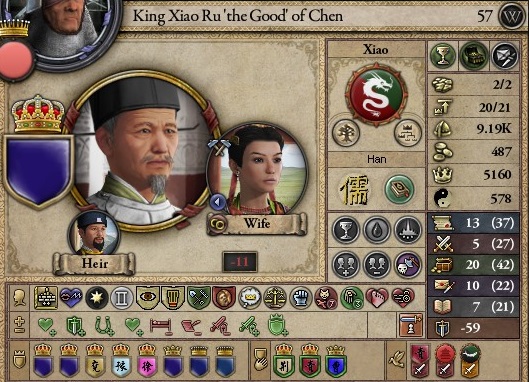
Xiao Ru also sent envoys to the Xianbei Confederacy to make a deal with Budugen the Great. The Xianbeis held lands in the north of Qing Province, lands that Xiao Ru was keen to get his hands on. Not only would this allow him to encircle Tan Shenquan’s territories, but reclaiming these lands from the barbarians would certainly boost his prestige and legitimacy. Of course, his embassy left with gifts and coffers of silver to compensate the Khagan for this loss of territories. While he dragged the negotiations and took joy in humiliating the envoys, Budugen proved to be warming up to the idea (or the bribes) as the year went on. His willingness to deal with the Chinese was shocking news to his son Xibaxiong, who abandoned his role as leader of the Liang barbarian cavalry to return home and try to knock some sense into his father’s head. In the end, he would not be able to convince his father to refuse the offer, although the young barbarian would swear a blood oath to one day reclaim those lands treacherously bought by the southerners. One day…
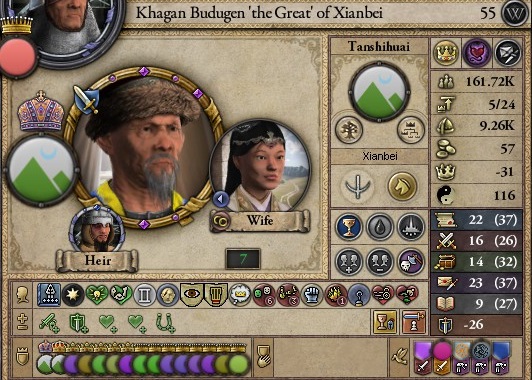
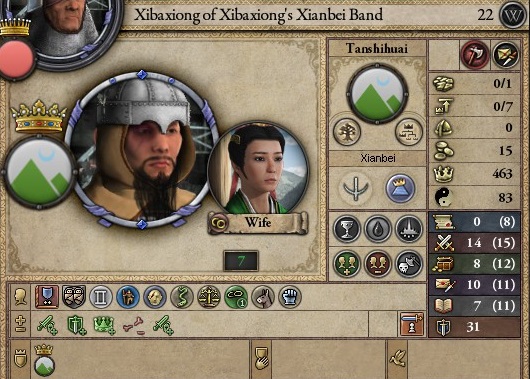
Things quickly accelerated once news of the conquest of Yang Province reached Chenguo. If Xiao Ru wanted to pull this off, he needed to do it before the end of the year, at which point Emperor Anwu might fancy moving against him for his overt actions toward usurpation. Soon after news of the conquest arrived, an official came forward with an even more surprising revelation. Ding Gongsi, Administrator of Liang Commandery, had a surprising visit during his sleep. The ghost of Emperor Qianfei had appeared to him to tell him that Xiao Ru had to claim his rightful destiny, that it was Heaven’s will. Of course, this completely real revelation did not specifically include a demand to claim the throne, though most could read through the lines.
Two weeks after this surprising turn of events, another official came forward to tell that he had also been visited by the ghost of Emperor Qianfei! What a surprise! And the ghostly emperor now wanted to pass upon Xiao Ru his most prized possession, which was implied to be the Mandate of Heaven. Of course, Xiao Ru did not openly accept the gift, whatever it might be. Then, two days later, another official came forward. But bungling the delivery of his lin… misremembering the previous night, he claimed that he had been visited by three Emperor Qianfei (instead of three ghost emperors including Emperor Qianfei)! Now embarrassed by the whole affair, Xiao Ru decided that maybe the officials should just keep these ghostly apparitions to themselves from now on.
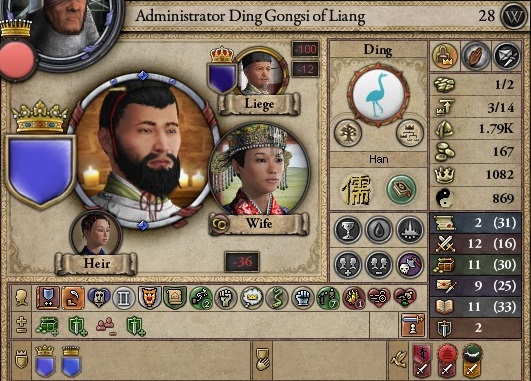
Then an unknown man appeared to the court, a man who Xiao Ru showed everyone that he didn’t know and had never met before (though his sons were acting strangely casual when interacting with the man). The stranger claimed that he had met a dragon at the Nansi Lake. The dragon had expressed that Emperor Anwu’s story of exchanging an eye with a dragon for a great destiny was a complete invention and that he did not hold the Mandate of Heaven. But this dragon, which was real unlike the one met by Emperor Anwu, was here to place upon Xiao Ru’s shoulders the mantle of greatness and destiny (whatever that meant). And Xiao Ru being far more amazing and worthy than the usurper in Chang’an, he didn’t need to offer anything in exchange this time! Amazing! Surprising! Completely true! One official tried pointing out that the end of this story seemed to hint that Emperor Anwu’s dragon was real after all, thus contradicting itself, for which Xiao Ru had him permanently removed from court.
And then came the classic, straight out of Wang Man’s playbook. A peasant found a strange rock in his field, with a simple inscription upon it: “Xiao Ru must be emperor.” This clearly heavenly (and not at all fabricated) rock was quickly brought to the local town sheriff, who immediately had it sent to the provincial capital. The rock was put on display throughout Chenguo, just to make sure that everyone had a good look at the rock that had clearly been carved by Heaven itself. But once again, Xiao Ru refused the order of Heaven, claiming that he was unworthy of such honor.
September proved the final step, and probably the most elaborate so far. A Confucian scholar (who just happened to be a close friend of the scholar Lang) appeared at court one day. He was clearly unexpected, as shown by the people all dressed up in the middle of the night to welcome his arrival. The scholar claimed to have been a part of Emperor Qianfei’s court during his attempt to reclaim power in 217. During that time, the emperor had given him a vital task to safeguard his Imperial insignias, his seal and an edict. Should he perish and the Han be usurped, this was to make its way to Xiao Ru, the most loyal and just and good and loyal and virtuous and loyal and loyal of all the Han officials. What a curious coincidence that this scholar had managed to safeguard everything needed for an imperial enthronement AND to come out just as Xiao Ru was being encouraged by Heaven to take the throne! Clearly a sign from Heaven once again!
Xiao Ru asked the scholar to read the edict, which had obviously been written by Emperor Qianfei himself and not some scribe in Chenguo. The edict dictated that should the Han be destroyed by the evil Yao Shuren, then Emperor Qianfei wanted the most righteous man in China to take up the Mandate of Heaven and succeed the Han as the rightful Emperor of China. And it just happened that Emperor Qianfei had named Xiao Ru as this man! What a massive twist!
Of course, Xiao Ru did as was expected in this situation and refused the throne. He was clearly unworthy. Surely there were more deserving members of the Liu Clan to take up this honor in his place. But surprisingly, the Prince of Rencheng came forward and insisted that Xiao Ru obey the edict. Liu Derun was by now convinced that this edict, as well as the whole story, was the complete truth. As a good imperial clansman, he was determined to uphold the will of Emperor Qianfei. In an unexpected move (even by Xiao Ru), Liu Derun declared that he relinquished his princedom, refusing to hold a title that might threaten the legitimacy of the holder of the Mandate. Cheers rang out at court, and this was followed by a cascade of similar moves from the Liu Clansmen, now feeling the pressure to do the same. They all stepped over each other to surrender their titles and reaffirm their loyalties to the Governor. Xiao Ru couldn’t have dreamed of a better endorsement.
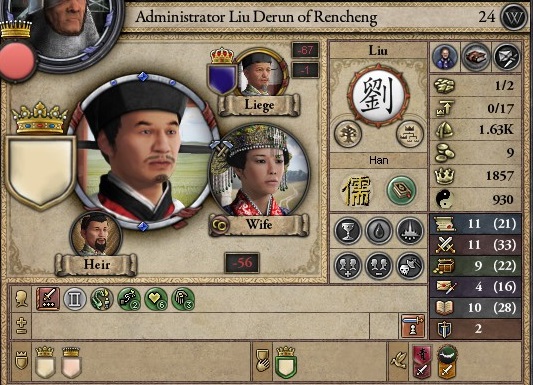
Finally, he had no choice but to accept the throne. Heaven wanted it, the people wanted it, his court wanted it. Even the former Imperial Clan was behind him. On the tenth of October 220, Xiao Ru became Emperor of China at the age of 57. He declared a new dynasty to succeed the Han, the Chen Dynasty, which would one day reclaim the whole of China from the evil usurper in Chang’an. He would posthumously be remembered as Emperor Cheng of Chen (陳成帝;
ChénChéng Dì; “The Successful Emperor of Chen”). Unlike Emperor Anwu, Emperor Cheng would not waste any time securing his succession, as his first edict was to appoint Xiao Tung as his new Crown Prince.
The news of Xiao Ru’s ascension brought a halt to the fighting, especially as envoys came to Tan Shenquan with an offer. Emperor Cheng clearly didn’t want to keep his new dynasty embroiled in a prolonged war that would leave him open to an attack by the Liang. Thus, he was offering his enemies one last chance at clemency. In exchange of surrendering Qing Province to him, they would all be allowed to keep their commanderies and be respected as officials of the Chen Dynasty. This offer brought even more pressure on the Qing forces as the Xianbei lands on their northern borders were officially being transferred to the new Chen Dynasty.
While Zhao Yun advised his ally to continue the fight, the generals Ba Daiping and He Jintao were pressuring their liege to accept the deal. Their forces were depleted and weakened. At best, they might be able to force a standstill, and for what? To wait for Ying Mo and the Liang Dynasty to conquer Qing Province? And while Emperor Cheng was proving magnanimous today, it was likely that Emperor Anwu wouldn’t be tomorrow. Frustrated at his powerlessness, Tan Shenquan eventually agreed to surrender the province. As the uncle of the governor, Ding Zhiguo was sent to negotiate the deal, ensuring that his nephew was well treated. By the end of October, Qing Province had passed into Chen hands, to the anger of Zhao Yun. In the end, both parties would come to regret this decision. Emperor Cheng would come to rue having kept Tan Shenquan alive, and the former governor would quickly miss the power he had willingly surrendered. But for now, the war was over, and peace had come to the new dynasty, the true legitimate dynasty. The Chen Dynasty!
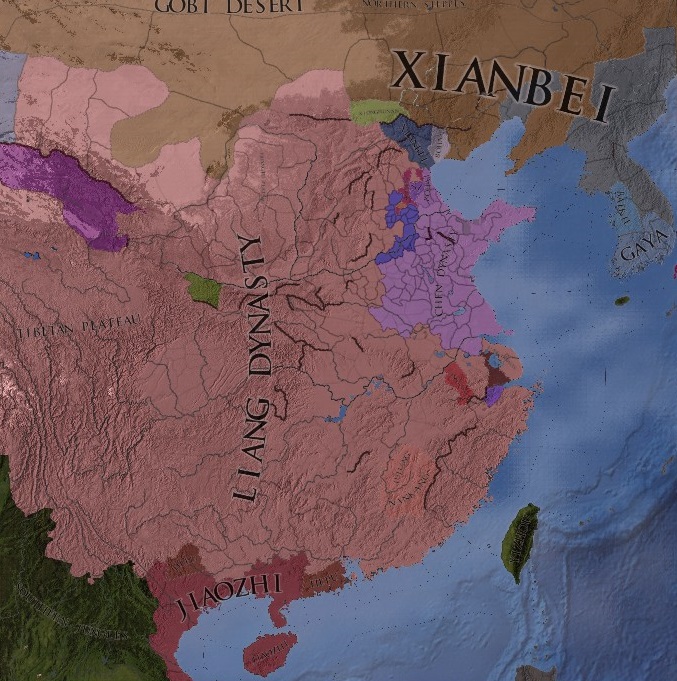
__________________________
PS: First of all, congratulations to
@Ixarys, as your character Xiao Ru managed to achieve the ultimate achievement: becoming Emperor. As with Yao Shuren, he shall now be called by his posthumous name, Emperor Cheng. I’d say that his rise was far more unexpected than that of Yao Shuren, as Xiao Ru crawled his way from nothing and struggled at every turn while Yao Shuren kinda cruised from success to success.
With the ascension of Xiao Ru and the founding of the Chen Dynasty, we officially put the Han Dynasty behind us!Now the story will shift toward the second part of this AAR, the “Liang-Chen Contention”. While this had already been the case for a while, we will from now on focus on the two rival states and their stories, instead of many warlords and characters spread throughout the map. Also, here is the update on every character and where they are at:
- Liu Siyuan (@EtzelHoveri ): Was killed by Feng Zian in 207 at the age of 44. His legacy is that of a great hero of the Han Dynasty, who helped Emperor Qianfei seize back control of his dynasty in a last ditched effort to save it. His last surviving son Liu Kun is currently living in the Chen Dynasty.
- Xiao Ru/Emperor Cheng of Chen (@Ixarys ): The newly enthroned emperor of the Chen Dynasty he started his reign by annexing Qing Province, which immediately gave him a strong position to work from. Currently has six children, a daughter (Xiao Xiaowen, 191) and three sons (Crown Prince Xiao Tung, 193, Xiao Bin, 196, and Xiao Dang 199) from his wife Lady Xia, as well as a son (Xiao Hanhe, 196) and a daughter (Xiao Cha, 206) from a concubine.
- Jiang Xian (@Massinissa the Wise ): The former Chancellor of the Han, he committed suicide in 206 at the age of 40 when it became clear that Yuan Shu would take Luoyang. Unlike Liu Siyuan, his legacy is that of a corrupt official who abused his authority and played a key role in weakening the Han through his machinations. Of the ten characters, he was the first and to die and the youngest at the time of his death. His family is still on the run, fearful that Emperor Anwu might want them dead for their association with the Han Dynasty.
- Feng Zian (@Idhrendur ): The late Grand Commandant of the Han Imperial Army, he died at the age of 43from injuries sustained during Yao Shuren’s invasion of the Han. Is often seen as the last great hero of the Han Dynasty. His two sons now fight on opposing sides, with Feng Yong pledging himself to the Liang Dynasty while Feng Guo currently serve the new Chen Dynasty.
- Xuan Su (@HistoryDude ): Xuan Su is currently back in control of Bing Province, General of the Flying Cavalry of the Liang Dynasty and a close advisor of Emperor Anwu. Even so, he still seek more power and influence for himself within the new regime. He has three daughter (Xuan Zhenfeng, 196, Xuan Zhaoyui, 207, Xuan Jinluan, 209), and five sons (Xuan Bohai, 200-200, and Xuan Mei, 204, Xuan Lu, 205, Xuan Zian, 208, Xuan Xueyou, 220).
- Hu Zan (@patpekala ): Hu Zan currently serves as Administrator of Donghai Commandery and is currently a general of the Chen Dynasty, though he has serves in various other offices under before the establishment of the Dynasty. His talents and his closeness with the crown prince seem to indicate that he is destined for a great career under the new imperial regime, though his relationship with Emperor Cheng is tense as of late. He has four sons, Hu Da (191-217) from his first marriage with Feng Ai and Hu Weizhi (198), Hu Jingxuan (200) and Hu Ah (201) from his second marriage with Zhu Fanjing. Also has a daughter Hu Xianji (207) from his third marriage with Chen Jiner. He has five grandsons, with Hu Zhongli (216-220) having already preceded him in death.
- Yang Weili (@Specialist290 ): Yang Weili was a great general who finished his career in the service of Xiao Ru, dying at the age of 58 from natural causes. He was the last of the character to die during the Han Dynasty, and in his last moments proved loyal to its restauration. His only surviving son Yang Qub is currently Administrator of Runan Commandery and the first Excellency of Works of the Chen Dynasty. He is also married to Feng Nuwang, daughter of Feng Zian, with who he had two sons (although only one of them, Yang Guangxu, is still alive).
- Yao Shuren/Emperor Anwu of Liang (@binobo ): Emperor Anwu has been the one to end the Han and replace it with his own Liang Dynasty, after which he successfully conquered Yang Province. He controld the entirely of western China. Has two daughters (Yao Ki, 194, and Yao Xiangjun, 195) from his late wife Guo Yuyi, a daughter (Yao Xiaoya, 202) and a son (Yao Xiu, 203) from his first Empress Cheng Guanglie, two daughters (Yao Shanxiang, 202, and Yao Suying, 204) from a concubine named Xiaofan, as well as a son (Crown Prince Yao Yuan, 205) and a daughter (Yao Chuntao, 217) from his current Empress Liang Na.
- Mo Jie (@Midnite Duke ): Mo Jie has recently returned to the Liang court to serve as Excellency of Works. He is also the Governor of Kong Province and has been made the Marquis of Kong. He most recently played a key role in the selection of the Liang Crown Prince, though not in the way he had hoped. He has six daughters, three from his wife Ma Yunlu (Mo Daiyu, 198, Mo Xiaowen, 204, Mo Shanwei, 207), two from a deceased concubine named Shaoming (Ma Zanghua, 203, Mo Zuimei, 207), and one from a concubine named Tonge (Ma Xinyue, 213), making him the only character of the cast yet to have a son.
- Pan Zheng (@Dunaden ): Pan Zheng currently served as Governor of Yi Province, Marquis of Yi, and most importantly, as the first ever Chancellor of the Liang Dynasty. Even with such responsibilities, his focus had mostly been on crushing the barbarians occupying Jiaozhi Province (a goal he had failed to achieve in spectacular fashions). He has two sons (Pan Zhiyuan, 198, Pan Ciqing, 216) and two daughters (Pan Ruoxin, 205, Pan Hongyu, 207) from his late wife Fang Xia, and one daughter (Pan Xiaoji, 206) from a concubine named Chunluo. His marriage with Princess Xiaoya, Emperor Anwu’s favorite daughter, has yet to produce any child.


